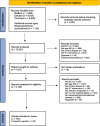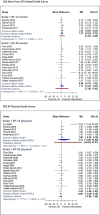Efficacy of sustained knowledge translation (KT) interventions in chronic disease management in older adults: systematic review and meta-analysis of complex interventions
- PMID: 37488589
- PMCID: PMC10367354
- DOI: 10.1186/s12916-023-02966-9
Efficacy of sustained knowledge translation (KT) interventions in chronic disease management in older adults: systematic review and meta-analysis of complex interventions
Abstract
Background: Chronic disease management (CDM) through sustained knowledge translation (KT) interventions ensures long-term, high-quality care. We assessed implementation of KT interventions for supporting CDM and their efficacy when sustained in older adults.
Methods: Design: Systematic review with meta-analysis engaging 17 knowledge users using integrated KT.
Eligibility criteria: Randomized controlled trials (RCTs) including adults (> 65 years old) with chronic disease(s), their caregivers, health and/or policy-decision makers receiving a KT intervention to carry out a CDM intervention for at least 12 months (versus other KT interventions or usual care).
Information sources: We searched MEDLINE, EMBASE, and the Cochrane Central Register of Controlled Trials from each database's inception to March 2020.
Outcome measures: Sustainability, fidelity, adherence of KT interventions for CDM practice, quality of life (QOL) and quality of care (QOC). Data extraction, risk of bias (ROB) assessment: We screened, abstracted and appraised articles (Effective Practice and Organisation of Care ROB tool) independently and in duplicate.
Data synthesis: We performed both random-effects and fixed-effect meta-analyses and estimated mean differences (MDs) for continuous and odds ratios (ORs) for dichotomous data.
Results: We included 158 RCTs (973,074 participants [961,745 patients, 5540 caregivers, 5789 providers]) and 39 companion reports comprising 329 KT interventions, involving patients (43.2%), healthcare providers (20.7%) or both (10.9%). We identified 16 studies described as assessing sustainability in 8.1% interventions, 67 studies as assessing adherence in 35.6% interventions and 20 studies as assessing fidelity in 8.7% of the interventions. Most meta-analyses suggested that KT interventions improved QOL, but imprecisely (36 item Short-Form mental [SF-36 mental]: MD 1.11, 95% confidence interval [CI] [- 1.25, 3.47], 14 RCTs, 5876 participants, I2 = 96%; European QOL-5 dimensions: MD 0.01, 95% CI [- 0.01, 0.02], 15 RCTs, 6628 participants, I2 = 25%; St George's Respiratory Questionnaire: MD - 2.12, 95% CI [- 3.72, - 0.51] 44 12 RCTs, 2893 participants, I2 = 44%). KT interventions improved QOC (OR 1.55, 95% CI [1.29, 1.85], 12 RCTS, 5271 participants, I2 = 21%).
Conclusions: KT intervention sustainability was infrequently defined and assessed. Sustained KT interventions have the potential to improve QOL and QOC in older adults with CDM. However, their overall efficacy remains uncertain and it varies by effect modifiers, including intervention type, chronic disease number, comorbidities, and participant age.
Systematic review registration: PROSPERO CRD42018084810.
Keywords: Chronic disease management; Integrated knowledge translation; Knowledge translation; Older adults; Patient and public involvement; Sustainability.
© 2023. The Author(s).
Conflict of interest statement
The authors declare that they have no competing interests.
Patient involvement and dissemination
This work involved one patient partner to ensure patient perspectives are integrated in our research question. The patient partner was involved from the outset when defining the research question, and we plan to meet regularly in the update of this review to support dissemination of the results. The research question was developed based on the patient’s concerns and priorities. The patient was not involved in the interpretation of results and writing of the article because she retired at that time and was unable to continue due to personal circumstances. The results will be disseminated to the lay audience through a press release, social media, through the SPOR-EA website and through public presentations.
Transparency declaration
The senior author (SES) affirms that this manuscript is an honest, accurate, and transparent account of the study being reported; that no important aspects of the study have been omitted; and that any discrepancies from the study as planned have been explained.
Copyright/license for publication
The corresponding author (SES) has the right to grant on behalf of all authors and does grant on behalf of all authors, a worldwide license to the publishers and its licensees in perpetuity, in all forms, formats and media (whether known now or created in the future), to (i) publish, reproduce, distribute, display and store the contribution, (ii) translate the contribution into other languages, create adaptations, reprints, include within collections and create summaries, extracts and/or, abstracts of the contribution, (iii) create any other derivative work(s) based on the contribution, (iv) to exploit all subsidiary rights in the contribution, (v) the inclusion of electronic links from the contribution to third party material wherever it may be located; and (vi) license any third party to do any or all of the above.
Figures





Comment in
-
Sustainability of knowledge translation interventions: the evidence lacks evidence.BMC Med. 2023 Aug 25;21(1):325. doi: 10.1186/s12916-023-03022-2. BMC Med. 2023. PMID: 37626386 Free PMC article. No abstract available.
References
-
- (EPOC) EPaOoC. EPOC Taxonomy [Available from: http://epoc.cochrane.org/epoc-taxonomy.
-
- Straus SE, Tetroe J, Graham ID. Knowledge translation in health care: moving from evidence to practice. 2. Chichester: John Wiley & Sons, Ltd.; 2013.
Publication types
MeSH terms
Grants and funding
LinkOut - more resources
Full Text Sources
Research Materials
Miscellaneous

